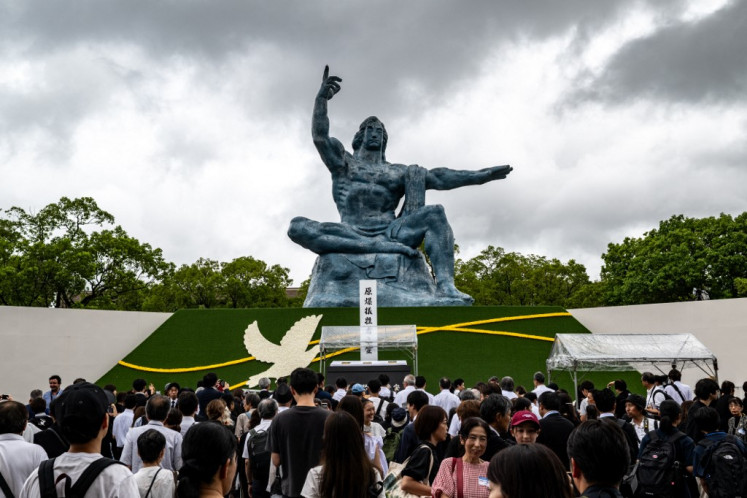Popular Reads
Top Results
Can't find what you're looking for?
View all search resultsPopular Reads
Top Results
Can't find what you're looking for?
View all search resultsSecuring daily necessities
In times of uncertainty, it is good to set rules because rules provide a sense of order and control. The government also needs to be clear in explaining any new rules and why they are important in the fight against the virus.
Change text size
Gift Premium Articles
to Anyone
T
he government was finally jolted into thinking and acting like it was in a wartime crisis, rather than a normal economic situation, when it began enforcing on Tuesday a rule that rations the sales of basic staples such as rice, cooking oil, sugar and instant noodles at supermarkets as a preemptive move to prevent hoarding and panic buying amid a series of containment measures to slow the spread of the coronavirus.
Read also: COVID-19: Police impose limits on staple food purchases amid panic buying
We need more of these kind of preemptive moves to get the country through the short-term health crisis — which may last months or even a year — without a wholesale economic and financial crisis.
Along this line of thought, the government should also step up monitoring and tighten the supervision of the production and flow of supplies from manufacturers and farmers to wholesalers and retailers to prevent speculative trading. In this context, the recent measures taken to ease the import of inputs for manufacturers of daily necessities are quite appropriate.
The challenge is that many chains already have to cope with a surge of traffic at both physical and online stores, as many people, apprehensive of more containment measures or even the risk of partial lockdown in severely hit areas, have started stockpiling and panic buying daily essentials.
Supply chains have posed a huge challenge for most companies as production and distribution center activity slowed down significantly. Social distancing and restrictions on travel networks created logistical bottlenecks, exacerbating inbound and outbound supply chain obstacles. These constraints left some suppliers unable to meet the surge in demand for staple items.
As more and more COVID-19 cases are being confirmed across the country, people have become increasingly worried that the government’s ability to properly inform and protect the people is utterly inadequate.
It is therefore most imperative now for the government to reestablish control over information and rumors that spark hoarding. In times of uncertainty, it is good to set rules because rules provide a sense of order and control. The government also needs to be clear in explaining any new rules and why they are important in the fight against the virus.
However vigorous government leaders and health experts are campaigning that individual risk is quite low and those who are in general good health should not panic, people are still apprehensive and have started hoarding daily necessities.
Fear is contagious. When we see other people go out of their way to protect themselves from disaster, no matter how unlikely, we don’t want to be the only ones left undefended. As rational people we have the drive to soothe uncertainty by buying as much as possible.
Read also: Why rational people are panic buying as coronavirus spreads
Consumers have begun to hoard necessities and household items, such as disease-prevention products and packaged, shelf stable foods. Even fresh produce purchases have accelerated, as can be seen in the wet traditional and wholesale fish market in Muara Baru and Muara Karang in Jakarta. This is because social distancing has forced more people to prepare more meals at home. Clear information is needed to curb the virus of fear.










